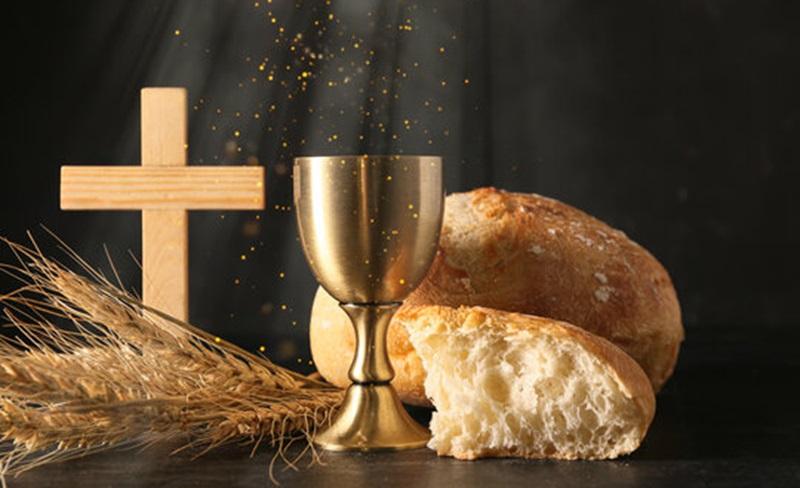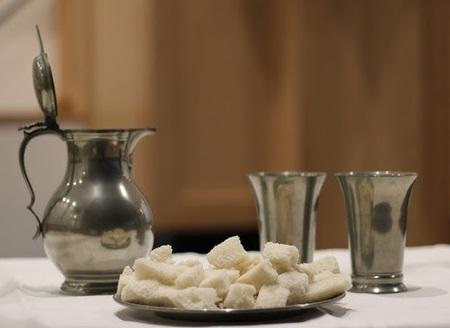How Frequently Should Communion Be Celebrated?
How Frequently Should Communion Be Celebrated?

It's apparent early on in the Bible that eating and drinking are means of enjoying communion with God. In his wonderful book, For the Life of the World, Eastern Orthodox theologian Alexander Schmemann indicates that even before Adam had been created God had a menu ready for him. Adam wouldn't have to work for his dinner or earn the right to eat fruit from the trees. The God of the Bible is unlike pagan gods who demand things of their worshippers before blessing them, but a God of grace who furnished the garden with wonderful things for Adam to enjoy before he could even take a breath.
All eating and drinking, in other words, is profoundly spiritual. The creation remains a menu today with a variety of meat, vegetables and sweets intended to delight us and draw us closer God in enjoyment of and gratitude for his provision. How much more intimate and meaningful are the eating and drinking that God commands for our corporate worship?
The Old Testament⤒🔗
As we read through the Old Testament we're struck by the significance of the fellowship meals the Israelites enjoyed with God under the terms of the old covenant. In the ordinary tabernacle/temple liturgy of Old Testament worship there were three main types of sacrifices, almost invariably offered in the following order (as in Leviticus 9):
-
a purification or sin offering followed by
-
an ascension offering (often mistakenly called a whole burnt offering) followed by
-
a fellowship or peace offering.
For our purposes it is noteworthy that the fellowship offering involved a meal the Israelite worshiper would enjoy with God (see, e.g., Leviticus 3:16 and Leviticus 7:15). In this fellowship offering the Israelites enjoyed sustenance and life from God's table and fellowship in peace and joy with God and with one another.
It's extraordinarily instructive that the temple liturgy concluded with a covenant meal in which God and man enjoyed climactic fellowship. From Genesis to Revelation the meal remains the pre-eminent symbol of God's intimate love and presence with humanity in Christ. God and man are at one and at peace around the table. This communal feast doesn't merely occupy the climactic place in the covenant renewal sequence, it caps off all of history as the redeemed bride of Christ participates in the festive marriage supper of the Lamb (Revelation 19:9, 17).
The New Testament←⤒🔗
In Acts 2:42 we read that the Holy Spirit-filled church “continued steadfastly in the apostles’ doctrine and fellowship, in the breaking of bread, and in prayers,” of which evangelical scholar F.F. Bruce writes, “The regular observance of the Lord's Supper is no doubt indicated.” What we see among the believers in Acts 2 is a remarkable enthusiasm for the Lord's Supper and a firm recognition of its central place in the ministry of the church, all of which the Scriptures record favorably.

As post-Pentecost church life became more routine and the practice of daily communion less feasible, the celebration of the Lord's Supper was finally assigned a regular place in the church's corporate worship on the Lord's Day.
Luke tells us in Acts 20:7, “Now on the first day of the week, when the disciples came together to break bread…”
John Calvin writes, “Therefore I come to the conclusion that a solemn day, that was going to be more convenient for all, was appointed among them for celebrating the Holy Supper of the Lord.”
The Lord's Supper, as we encounter it in Acts, is never celebrated more infrequently than weekly. While this narrative is certainly not prescriptive for us, it is informative, and our deviation from the apostolic pattern set forth in Scripture should, minimally, make us pause and reflect on the issue.
The instructions the apostle Paul gives the Corinthians about the Lord's Supper are also important. The apostle calls the Lord's Supper, for example, the communion of the body and blood of Christ (1 Corinthians 10:16). This is probably the main reason why John Calvin wanted communion to be celebrated at least weekly in Geneva. If we truly commune with the Lord Jesus Christ in the Lord's Supper and our union with Him is thereby strengthened and nourished, why would we, the branches, not want the life of the Vine communicated to us often?
The apostle also indicates that the Lord's Supper signifies the oneness of the body of Christ (1 Corinthians 10:17). When believers gather to partake of the same bread and wine, there is no Jew or Gentile, black or white, rich or poor, male or female. All are one because all partake of the one bread. In his book Given For You, Keith Mathison writes,
If the faithful teaching of this truth accompanies the frequent observance of the Lord's Supper, it inhibits division because it repeatedly and forcefully emphasizes the sinfulness of worshiping with an unforgiving heart.
Church History←⤒🔗
In his The Shape of Liturgy, Dom Gregory Dix argues that weekly communion fell into disuse around the time of the barbarian invasions of the Roman empire. As the barbarians began to dominate the scene, they insisted upon admission to the church via baptism, though in many cases without a change of heart. Church leaders surmised that they couldn't serve the Lord's Supper to them with any integrity. Hence the church began to shy away from weekly communion.
The Reformers, with the sole exception of Zwingli, were committed to the reinstatement of weekly communion. Calvin's pleas for communion “at least weekly” were never approved by the Genevan city council, which exercised authority over both civil and ecclesiastical realms. The Genevan council was influenced by Zwingli's minimalist view of the sacrament and was inordinately concerned about the possibility of unbelievers partaking of the sacrament.
Calvin argued that the Lord's Supper was,
to be frequently used among all Christians in order that they might frequently return in memory to Christ's Passion, by such a remembrance to sustain and strengthen their faith, and urge themselves to sing thanksgiving to God and to proclaim his goodness. Institutes 4.17.44.
The Reformed Confessions←⤒🔗
The Reformed confessions clearly support Calvin's position. Lord's Day 25 of the Heidelberg Catechism teaches us that the sacraments confirm the faith which is worked in our hearts by the Holy Spirit and more fully declare and seal to us the promise of gospel. The sacraments assure us that we are benefactors of Christ's death on the cross (see Lord's Day 29) and by our participation in the Holy Supper we are increasingly united to Christ's sacred body (see Lord's Day 28).

The Belgic Confession's treatment of the sacraments is substantially the same as the catechism's.
In Article 33 we read that God has “joined” the sacraments to the Word of the gospel, “the better to present to our senses both that which He declares to us by His Word and that which He works inwardly in our hearts, thereby confirming in us the salvation which He imparts to us.”
One of the first things the Belgic Confession stresses is the close relationship and tight correspondence between the Word and the sacrament. John Calvin, in fact, was of the mind that the preached Word cannot have its full effect without the sacraments.
Another element stressed by the Confession is the significance and integrity of the sacraments.
Article 33 says, “The signs are not empty or meaningless, so as to deceive us.”
Likewise, article 35 says, “Jesus Christ has not enjoined to us the use of His sacraments in vain, so He works in us all that He represents to us by these holy signs.”
When, we are offered bread, it's because the Lord truly intends to feed us. When we are offered wine, it's because the Lord truly intends to enliven us.
The last element stressed by the Confession is what we might call the motivating factor.
Article 33 says, “We are moved by the use of this holy sacrament to a fervent love towards God and our neighbor.”
It's always important to remember both the vertical and horizontal dimensions to sacramental participation. The Lord's Supper enhances our love for God, but it also feeds our love for one another, with whom we sit at the table, without conflict or disharmony.
The acknowledgment that preached Word and sacrament belong together, that the sacraments are meaningful and well-meant and that the Lord's Supper spurs us on in love for God and one another provides us a solid foundation for frequent communion.

Add new comment